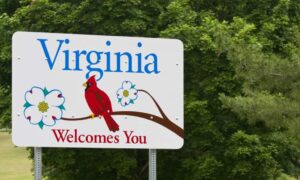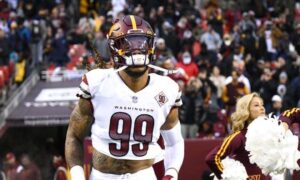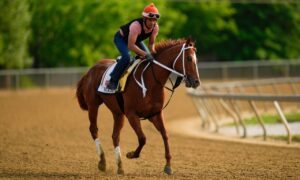How Virginia Became First US State To Reach $1 Billion In Sports Wagers


It’s official: No US state has tallied $1 billion in sports betting handle faster than Virginia, which eclipsed the 10-figure mark in about four months.
The Virginia Lottery, which oversees legal sportsbooks in VA, on Thursday released its May sports betting report.
In all, VA sports bettors tallied $226,963,573 in wagers in May, which was the commonwealth’s fourth full month of betting.
That brings the overall total since a late-January launch to nearly $1.1 billion – $1,092,137,212.
Virginia’s road to $1 billion in sports wagers
One of Virginia’s neighbors, Tennessee, previously held the record for the fastest state to $1 billion in sports wagers.
The Volunteer State, which launched legal sports wagering in November 2020, reached the 10-figure mark in about six months.
Prior to Tennessee, New Jersey, which is currently the king of US sports betting states, held the record. With an early launch and the ability to draw New Yorkers over the border, NJ reached $1 billion in wagers during its seventh month after a June 2018 launch.
Sports betting formally launched on Jan. 21 in Virginia. That’s when FanDuel Sportsbook debuted in conjunction with the Washington Football Team. Six other sportsbooks have subsequently debuted in VA, and three more have permits but haven’t yet launched.
Virginia’s busiest month for sports betting came in March. With the boost from college basketball betting during the popular March Madness tournament, Virginia bookmakers collected more than $304 million in sports wagers.
Here’s the full Virginia road to $1 billion in sports wagers:
| Month | Handle | GGR | Hold % | Promos | Other deductions | AGR | Taxes |
|---|---|---|---|---|---|---|---|
| February 2022 | $401,889,135 | $27,498,133 | 6.8% | $15,816,234 | $3,797,649 | $7,884,250 | $7,884,250 |
| January 2022 | $485,544,417 | $39,050,067 | 8.0% | $16,850,981 | $3,978,519 | $18,220,567 | $2,876,609 |
| December 2021 | $426,596,891 | $31,515,015 | 7.4% | $17,051,709 | $4,339,908 | $10,123,398 | $1,729,130 |
| November 2021 | $402,621,132 | $48,337,037 | 12.0% | $14,993,073 | $3,417,267 | $29,926,697 | $4,233,167 |
| October 2021 | $427,320,306 | $30,160,385 | 7.1% | $15,805,261 | $4,569,424 | $9,785,700 | $1,746,204 |
| September 2021 | $293,851,531 | $30,929,243 | 10.5% | $17,422,068 | $3,172,781 | $10,334,395 | $1,557,498 |
| August 2021 | $182,418,252 | $17,967,427 | 9.9% | $6,868,639 | $2,410,724 | $8,688,064 | $1,378,539 |
| July 2021 | $161,901,955 | $19,965,556 | 12.3% | $4,375,872 | $2,898,664 | $12,691,020 | $1,864,433 |
| June 2021 | $234,943,435 | $22,006,296 | 9.4% | $4,983,544 | $2,125,855 | $14,896,898 | $2,273,995 |
| May 2021 | $226,963,573 | $23,173,549 | 10.2% | $5,168,732 | $2,341,616 | $15,663,201 | $2,381,115 |
| April 2021 | $236,432,523 | $19,442,317 | 8.2% | $5,529,294 | $2,532,886 | $11,380,137 | $1,652,147 |
| March 2021 | $304,066,245 | $26,573,877 | 8.7% | $10,340,533 | $2,388,332 | $13,845,012 | $1,183,487 |
| February 2021 | $265,778,306 | $12,238,730 | 4.6% | $13,187,560 | $2,282,972 | ($3,231,752) | $300,594 |
| January 2021 | $58,896,564 | $3,586,077 | 6.1% | $6,343,077 | $478,612 | ($3,235,612) | $39,710 |
| Total | $4,109,224,266 | $352,443,759 | 8.6% | $154,736,576 | $40,735,209 | $156,971,974 | $24,622,911 |
VA likely crossed the threshold for $1B in sports wagers during mid-May. However, the VA Lottery didn’t give an exact date when the VA sports-betting apps reached the mark.
A look at VA’s May sports betting handle
VA sportsbooks won $23.2 million in May. That’s up from the $19.4 million they cleared in during April – despite a monthly handle that decreased by 4.4% from month to month.
The adjusted gross revenue (AGR) for May was $15.7 million, which is up from $11.4 million in April.
Overall in May, VA sportsbooks generated $2.4 million in state taxes, with $59,528 for problem gambling support.
Like April, May is typically a slower month for sportsbooks across the country. Without NCAA basketball, the NFL, or college football, sports bettors just aren’t as active in the spring.
However, bettors still had plenty of options, including MLB, the NBA, NHL, WNBA, PGA Tour, NASCAR, UFC, and other major sports leagues.
The recent sports-betting decline at VA sportsbooks is similar to what most major US sports betting markets have experienced.
Of the top 10 U.S. markets that have reported May data, Virginia’s month-over-month decrease in wagering was greater than New Jersey (up 8.9%), Indiana (up 7.6%), Colorado (up 1.9%), and Iowa (down 2.9%). However, it wasn’t as significant as those in Michigan (down 6.0%), Tennessee (down 6.7%), and Pennsylvania (down 6.7%).
The VA Lottery doesn’t break down revenue by sportsbook operator. However, during a VA Lottery Board meeting earlier this year, officials said FanDuel had accounted for 53% of all wagers during the first two-plus months of betting.
How Virginia got to $1 billion so quickly
While FanDuel was first out of the gate, others have since entered the VA market.
Those sportsbooks include DraftKings (debuted Jan. 24), BetMGM (Jan. 27), BetRivers (Jan. 27), William Hill (Feb. 2), WynnBet (March 11), and Unibet (April 28).
The first five sportsbooks were taking wagers in time for Super Bowl LV on Feb. 7. The annual NFL championship game is one of the biggest betting events of the year, and helped jumpstart the VA market.
Bally’s, Golden Nugget Online Sportsbook, and Barstool Sportsbook also have all received permits in Virginia, but they haven’t launched. Company officials are targeting a debut in time for the NCAA football and NFL season in August and September.
Additionally, when the first Virginia casinos begin opening in 2022 and 2023, they’re expected to have retail sportsbooks on site.
That competitive market is one reason Virginia was the first to reach the $1 billion milestone. A reasonable tax rate (15%) and few market limitations (aside from a ban on betting on in-state schools) also played a part.
Virginia also benefited from some fortunate timing. Many other states launched sports betting in 2020, when the COVID-19 pandemic forced a near-shutdown of the sports world. Virginia, meanwhile, launched after many sports leagues had returned or were in the process of returning to more normal schedules.







